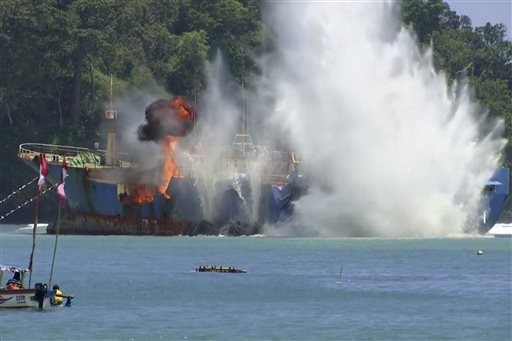Popular Reads
Top Results
Can't find what you're looking for?
View all search resultsPopular Reads
Top Results
Can't find what you're looking for?
View all search resultsTraditional fishing: A game changer in the SCS?
Following the incident of March 19, Jakarta is clearly unable to maintain its neutral position as a non-claimant; neither can it aspire further to be an independent mediator in the conflict over the South China Sea.On March 19, a Chinese coast guard vessel was reported to have intentionally hit the Chinese fishing boat Kway Fey to stop it from being pulled by the Indonesian authority’s vessel to Indonesian shores.The KM Kway Fey was towed and its crew was transferred to Indonesia’s KP Hiu 11 by a patrol from the Indonesian Navy; the Chinese boat’s crew was apprehended for illegal fishing in Indonesia’s exclusive economic zone, according to the Maritime Affairs and Fisheries Ministry.
Change text size
Gift Premium Articles
to Anyone
I
ndonesia’s recent diplomatic protest to China over the resumption of alleged illegal trans-border fishing near the waters of the Natuna Islands marks a new episode of conflict management in the South China Sea.
The scholar Ann Marie Murphy in 2014 predicted the unavoidable “game changer” in the South China Sea after Indonesia officially protested China’s “nine-dash line” map at the UN in 2010 and requested China’s clarification.
Up until the recent incident, China never replied to this request. China unilaterally declared their map in 2009.
Our Defense Ministry alerted everyone to the potential conflict near Natuna waters by making the area a priority for naval patrol.
Following the incident of March 19, Jakarta is clearly unable to maintain its neutral position as a non-claimant; neither can it aspire further to be an independent mediator in the conflict over the South China Sea.
On March 19, a Chinese coast guard vessel was reported to have intentionally hit the Chinese fishing boat Kway Fey to stop it from being pulled by the Indonesian authority’s vessel to Indonesian shores.
The KM Kway Fey was towed and its crew was transferred to Indonesia’s KP Hiu 11 by a patrol from the Indonesian Navy; the Chinese boat’s crew was apprehended for illegal fishing in Indonesia’s exclusive economic zone, according to the Maritime Affairs and Fisheries Ministry.
Similar incidents occurred in 2013 and in 2010 when a Chinese coast guard boat, the Yuzheng 311, reportedly pointed a machine gun at an Indonesian patrol boat to make it release a Chinese fishing boat apprehended for illegal fishing.
In response to Jakarta’s protest the Chinese Foreign Ministry reaffirmed official recognition of Indonesian sovereignty over the Natuna Islands but insisted its fishermen were conducting “normal” operations in their “traditional fishing grounds”.
The current firm position of Indonesia should not be a surprise. The maritime axis doctrine introduced by President Joko “Jokowi” Widodo has signaled the focus of Indonesian foreign policy on maritime issues, especially regarding illegal and unreported trans-border fishing.
Minister Susi Pudjiastuti’s policy of burning boats found to be guilty of such practices within Indonesian waters is strongly supported by the Navy, following the increased military budget as promised by Jokowi’s administration.
Keyuan Zou, an expert in international law, wrote that China’s maritime vision developed especially after the Declaration of its Territorial Sea on Sept. 4, 1958 and China’s participation at the Third UN Conference on the Law of the Sea in 1971.
Zou mentions ocean exploration was once undertaken during the Ming Dynasty (1368-1644) and is remembered in the well-known stories of Commander Zheng He. His maritime journeys were frequently cited by the Chinese as historical justification for their “traditional fishing grounds” in the South China Sea, including near Natuna waters.
Zhou concludes that only after 1978, following its economic reform and its open-door policy, did Beijing start to shape its ocean policies. China’s Ocean Policy and Working Outlines were issued in 1991 and the Blue Book on Marine Technology Policy in 1993.
Following its economic growth, including its military modernization project, China grew more confident and capable of further pursuing its oceanic policy aggressively.
Despite China’s territorial claims over the Paracel and Spratly Islands in the South China Sea, which still puts it in conflict with Taiwan, Vietnam, Malaysia, the Philippines, Brunei and Malaysia, China unilaterally and rigorously pursues its oceanic policy through affirming territorial control of the sea surrounding those islands by both legal and de facto practices, citing historic justification.
This strategy was once adopted by Indonesia when Jakarta declared its concept of archipelagic states unilaterally under the Djuanda Declaration in 1957.
China reproduced the map of the nine-dash line and ratified the UN Convention on the Law of the Sea (UNCLOS). Meanwhile China continues to strengthen its presence in the areas through military deployment, economic and facility development. The last incident over fishing with Indonesia signals its constant presence and surveillance to establish its sovereignty at sea.
Some believe that the US’ absence at UNCLOS forums on the South China Sea due its non-ratified status, contributes to strengthening China’s position in the area.
While Jakarta cites traditional fishing “rights” to protect access of Indonesian fishermen in the northern coast of Australia, China uses “traditional fishing grounds” to justify fishermen’s activities in the South China Sea, including near Natuna waters.
China’s “language diplomacy” invites prejudice over Chinese expansionist territorial claims in the South China Sea.
Its economic and military power seems adequate for China to contest current regulations on traditional fishing. Moreover, the repeated engagement of the Chinese coast guard in intercepting apprehended Chinese vessels accused of illegal fishing affirms a strong Chinese gesture over territorial claims in our EEZ near the Natuna Islands.
Traditional Indonesian fishing rights in Australian waters were recognized under the 1974 agreement between Indonesia and Australia.
In 1976, Jakarta also signed an agreement with Malaysia to recognize traditional Malaysian fishing rights within Indonesian waters near the Natuna Islands.
Actually, both agreements over traditional fishing rights are limited to traditional boats and fishing gear. Most reports I could access mention that Chinese fishing fleets largely operate with modern equipment rather than traditional boat and gear.
Later in 1982, the concept was accommodated within UNCLOS along with the concept of archipelagic states. Since then, Indonesia was granted status as an archipelagic state including the recognition of traditional fishing rights.
The Indonesian expert Hasjim Djalal has said traditional fishing rights should be granted when the fishermen are descended from the original ones, the traditional fishing gear is used, the same grounds are fished and they are fishing for the same traditional catches.
Yet determining “illegal” trespassing of trans-border fishing requires the high technology of a global positioning system (GPS). Indonesian fishermen apprehended by Australian patrols, for example, frequently contest the “exact” borders by questioning the thickness of the coordinates in the GPS as well as blaming the wind and fish for dragging their boats into Australian waters.
De-escalation of the conflict and opportunities to reach a settlement through a peaceful means are still widely open if the parties can restrain themselves from exploiting nationalistic symbols of territorial sovereignty and if they can accommodate diverse solutions.
For instance, Indonesia could initiate an open and comprehensive dialogue for further discourse on traditional fishing practices.
Joint historical and social and anthropological research of traditional trans-border fishing practices near the Natuna Islands between Indonesia and China could be a start to find a common platform to de-escalate tension and de-politicize the incident.
***
The writer is a lecturer at the Department of International Relations of the Paramadina Graduate School, Paramadina University.
---------------
We are looking for information, opinions, and in-depth analysis from experts or scholars in a variety of fields. We choose articles based on facts or opinions about general news, as well as quality analysis and commentary about Indonesia or international events. Send your piece to community@jakpost.com.










